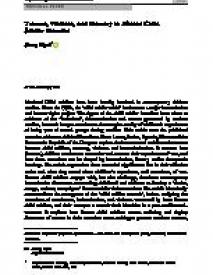Trauma, Violence, and Memory in African Child Soldier Memoirs
Child soldiers have been heavily involved in contemporary African warfare. Since the 1990s, the ‘child soldier crisis’ has become a major humanitarian and human rights project. The figure of the child soldier has often been taken as evidence of the ‘barbarism’, dehumanization and trauma generated by modern warfare, but such images can obscure the complex reality of children’s experiences of being part of armed groups during conflict. This article uses the published memoirs of former child soldiers from Sierra Leone, Sudan, Uganda, Eritrea and the Democratic Republic of the Congo to explore the instrumental and discursive nexus between child soldiers, memory, violence and humanitarianism. It assesses how (former-) children combatants remember and recount their experiences of war, and how these narratives can be shaped by humanitarian, literary and/or therapeutic framings. The article argues that these memoirs’ significance lies in their affective truths and what they reveal about children’s experience, and narrations, of war. Former child soldiers engage with, but also challenge, dominant contemporary humanitarian discourses surrounding childhood and violence to develop a ‘victim, savage, saviour, campaigner’ framework for their narratives. The article historically contextualizes the emergence of the ‘child soldier memoir’, before analysing the narratives of recruitment, indoctrination, and violence recounted by these former child soldiers, and their attempts to rework their identities in a post-conflict environment. It explores how former child soldiers narrate suffering and deploy discourses of trauma in their memoirs: some seeking to process wartime traumas, others leveraging their own suffering to position themselves as campaigners for those children still caught in conflict.
Geachte bezoeker,
De informatie die u nu opvraagt, kan door psychotraumanet niet aan u worden getoond. Dit kan verschillende redenen hebben,
waarvan (bescherming van het) auteursrecht de meeste voorkomende is. Wanneer het mogelijk is om u door te verwijzen naar de bron
van deze informatie, dan ziet u hier onder een link naar die plek.
Als er geen link staat, kunt u contact opnemen met de bibliotheek,
die u verder op weg kan helpen.
Met vriendelijke groet,
Het psychotraumanet-team.
In: Culture, Medicine, and Psychiatry ISSN: 0165-005X | 45 | march | 74–96
https://link.springer.com/article/10.1007%2Fs11013-020-09668-4
Open Access


